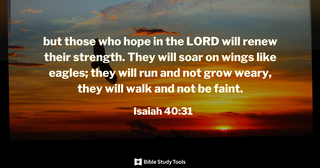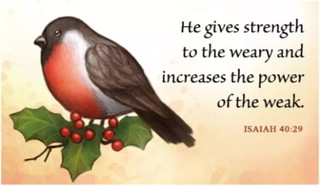- Recent Translations
- All Translations
Yeshayah 40
Share
Settings
Yeshayah 40 Commentary
Chapter 40
The preaching of the gospel, and glad tidings of the coming of Christ. (1-11) The almighty power of God. (12-17) The folly of idolatry. (18-26) Against unbelief. (27-31)
Verses 1-11 All human life is a warfare; the Christian life is the most so; but the struggle will not last always. Troubles are removed in love, when sin is pardoned. In the great atonement of the death of Christ, the mercy of God is exercised to the glory of his justice. In Christ, and his sufferings, true penitents receive of the Lord's hand double for all their sins; for the satisfaction Christ made by his death was of infinite value. The prophet had some reference to the return of the Jews from Babylon. But this is a small event, compared with that pointed out by the Holy Ghost in the New Testament, when John the Baptist proclaimed the approach of Christ. When eastern princes marched through desert countries, ways were prepared for them, and hinderances removed. And may the Lord prepare our hearts by the teaching of his word and the convictions of his Spirit, that high and proud thoughts may be brought down, good desires planted, crooked and rugged tempers made straight and softened, and every hinderance removed, that we may be ready for his will on earth, and prepared for his heavenly kingdom. What are all that belongs to fallen man, or all that he does, but as the grass and the flower thereof! And what will all the titles and possessions of a dying sinner avail, when they leave him under condemnation! The word of the Lord can do that for us, which all flesh cannot. The glad tidings of the coming of Christ were to be sent forth to the ends of the earth. Satan is the strong man armed; but our Lord Jesus is stronger; and he shall proceed, and do all that he purposes. Christ is the good Shepherd; he shows tender care for young converts, weak believers, and those of a sorrowful spirit. By his word he requires no more service, and by his providence he inflicts no more trouble, than he will strengthen them for. May we know our Shepherd's voice, and follow him, proving ourselves his sheep.
Verses 12-17 All created beings shrink to nothing in comparison with the Creator. When the Lord, by his Spirit, made the world, none directed his Spirit, or gave advice what to do, or how to do it. The nations, in comparison of him, are as a drop which remains in the bucket, compared with the vast ocean; or as the small dust in the balance, which does not turn it, compared with all the earth. This magnifies God's love to the world, that, though it is of such small account and value with him, yet, for the redemption of it, he gave his only-begotten Son, ( John 3:16 ) . The services of the church can make no addition to him. Our souls must have perished for ever, if the only Son of the Father had not given himself for us.
Verses 18-26 Whatever we esteem or love, fear or hope in, more than God, that creature we make equal with God, though we do not make images or worship them. He that is so poor, that he has scarcely a sacrifice to offer, yet will not be without a god of his own. They spared no cost upon their idols; we grudge what is spent in the service of our God. To prove the greatness of God, the prophet appeals to all ages and nations. Those who are ignorant of this, are willingly ignorant. God has the command of all creatures, and of all created things. The prophet directs us to use our reason as well as our senses; to consider who created the hosts of heaven, and to pay our homage to Him. Not one fails to fulfil his will. And let us not forget, that He spake all the promises, and engaged to perform them.
Verses 27-31 The people of God are reproved for their unbelief and distrust of God. Let them remember they took the names Jacob and Israel, from one who found God faithful to him in all his straits. And they bore these names as a people in covenant with Him. Many foolish frets, and foolish fears, would vanish before inquiry into the causes. It is bad to have evil thoughts rise in our minds, but worse to turn them into evil words. What they had known, and had heard, was sufficient to silence all these fears and distrusts. Where God had begun the work of grace, he will perfect it. He will help those who, in humble dependence on him, help themselves. As the day, so shall the strength be. In the strength of Divine grace their souls shall ascend above the world. They shall run the way of God's commandments cheerfully. Let us watch against unbelief, pride, and self-confidence. If we go forth in our own strength, we shall faint, and utterly fall; but having our hearts and our hopes in heaven, we shall be carried above all difficulties, and be enabled to lay hold of the prize of our high calling in Christ Jesus.
Yeshayah 40 Commentaries
Chapter Summary
INTRODUCTION TO ISAIAH 40
This chapter treats of the comforts of God's people; of the forerunner and coming of the Messiah; of his work, and the dignity of his person; of the folly of making idols, and of the groundless complaints of the church of God. The consolations of God's people, by whom to be administered, and the matter, ground, and reason of them, Isa 40:1,2. John the Baptist, the harbinger of Christ, is described by his work and office, and the effects of it; it issuing in the humiliation of some, and the exaltation of others, and in the revelation of the glory of Christ, Isa 40:3-5, then follows an order to every minister of the Gospel what he should preach and publish; the weakness and insufficiency of men to anything that is spiritually good; their fading and withering goodliness, which is to be ascribed to the blowing of the Spirit of God upon it; and the firmness and constancy of the word of God is declared, Isa 40:6-8, next the apostles of Christ in Jerusalem are particularly exhorted to publish fervently and openly the good tidings of the Gospel; to proclaim the coming of Christ, the manner of it, and the work he came about; and to signify his faithful discharge of his office as a shepherd, Isa 40:9-11, the dignity of whose person is set forth by his almighty power, by his infinite wisdom, and by the greatness of his majesty, in comparison of which all nations and things are as nothing, Isa 40:12-17 and then the vanity of framing any likeness to God, and of forming idols for worship, is observed, Isa 40:18-25, and from the consideration of the divine power in creation and upholding all things, the church of God is encouraged to expect renewed strength and persevering grace, and is blamed for giving way to a distrustful and murmuring spirit, Isa 40:26-31.


